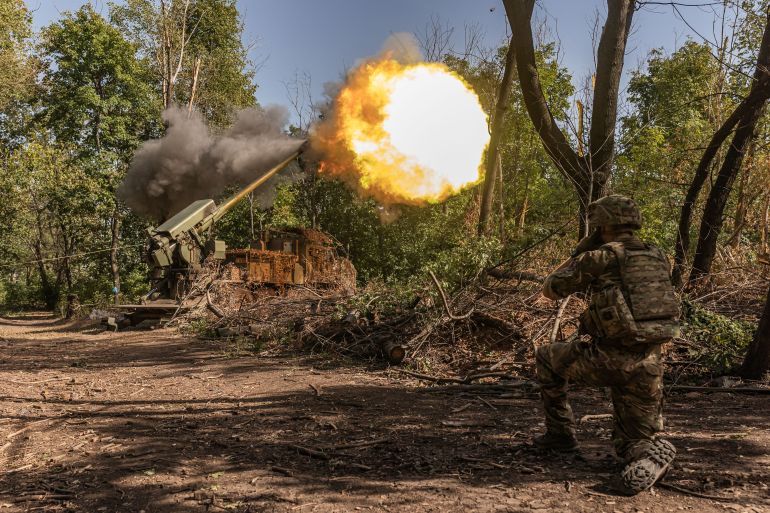Zelenskyy on security guarantees shuttle as fighting rages in Ukraine war
UK’s Starmer and France’s Macron will co-host a virtual meeting for the ‘coalition of the willing’ on Thursday.

Published On 3 Sep 20253 Sep 2025
Baltic and Nordic leaders in Denmark’s Copenhagen are meeting Ukrainian President Volodymyr Zelenskyy, who is on a diplomatic drive trying to cement security guarantees for Kyiv in the event of a peace deal to end Russia’s war in Ukraine.
“The heads of state and government will discuss how the Nordic-Baltic countries can ensure further support for Ukraine on the frontline and in the negotiating room,” Danish Prime Minister Mette Frederiksen’s office said in a statement on Wednesday.
Recommended Stories
list of 4 items
Russia-Ukraine war: List of key events, day 1,287
end of list
The gathering brings together the leaders of the Nordic-Baltic Eight (NB8) – Denmark, Estonia, Finland, Iceland, Latvia, Lithuania, Norway and Sweden – with Zelenskyy to discuss Ukraine’s future.
Finnish President Alexander Stubb said on Tuesday that progress was being made on security guarantees for Ukraine, but he stressed that such measures would only be implemented after a peace agreement is reached.
“We need to coordinate the security arrangements with the United States, which essentially will provide the backstop for this … We’re focusing on these issues with our chiefs of defence, which are drawing the concrete plans of what this type of operation might look like,” Stubb told reporters.
“We’re making progress on this and hopefully we’ll get a solution soon,” he said, while cautioning that he was not optimistic about a ceasefire or peace agreement with Russia in the near term.

The ‘coalition of the willing’
NATO Secretary-General Mark Rutte said he expected clarity at a summit of Ukraine’s allies on Thursday “or soon after” on what security guarantees Europe can offer Kyiv once the war halts.
Advertisement
“I expect tomorrow, or soon after tomorrow, to have clarity on what collectively we can deliver,” Rutte said at a news conference with Estonian President Alar Karis in Brussels. “That means that we can engage even more intensely, also with the American side, to see what they want to deliver in terms of their participation in security guarantees.”
United Kingdom Prime Minister Keir Starmer and French President Emmanuel Macron will co-host Thursday’s mostly virtual meeting of leaders of the so-called “coalition of the willing” – a collection of Western states working on long-term guarantees for Ukraine, and NATO. Zelenskyy moves on to meet Macron tonight in Paris ahead of that summit.
Western officials have said such guarantees are aimed at deterring Russia from launching another war after hostilities end, whether through a ceasefire or a permanent peace deal.
They are expected to centre on continued military support for Kyiv, along with an international force to reassure Ukraine. However, European leaders have made clear that such a force would only be feasible with US participation.
United States President Donald Trump last month promised American involvement, but Washington has yet to spell out what it would contribute. Rutte sought to reassure eastern NATO members that resources for Ukraine’s security guarantees would not come at the expense of the alliance’s own defences.
“We have to prevent spreading our resources too thinly, and this means that we always have to look at what the impact will be on the NATO plans,” he said.
Moscow, meanwhile, rejects the idea of European peacekeeping troops on the ground in Ukraine, and insists that any future settlement must reflect what it calls “new territorial realities”.
Russian Foreign Minister Sergey Lavrov told Indonesia’s Kompas newspaper that regions annexed by Russia – Crimea, Donetsk, Luhansk, Zaporizhia and Kherson – must be “recognized and formalized in an international legal manner” for peace to last.
Trump has suggested any eventual deal would involve Ukraine ceding some territory, but many analysts believe one of Russian President Vladimir Putin’s core demands will be Ukrainian recognition of Moscow’s control over the parts of Donbas still under Kyiv’s authority.
Zelenskyy has repeatedly rejected such concessions, warning that losing any territory would embolden Russia to launch new attacks in the future. The Ukrainian constitution also forbids it.
Russia takes more territory in Kherson
As diplomacy continues behind the scenes, Russia’s assault continues to intensify across eastern Ukraine. Its forces claim to have encircled and now captured “about half” of Kupiansk, a strategic city in the northeastern Kharkiv region. Moscow’s Ministry of Defence also claimed its forces had seized the settlement of Fedorivka in Donetsk.
Advertisement
In the skies, Russia launched a sweeping overnight air campaign, striking targets across nine regions. Ukrainian officials said at least four railway workers were injured, while Poland scrambled defence aircraft as explosions echoed near its border.
Ukraine’s emergency services reported that five people were injured and 28 homes damaged in an attack on the Znamianka community in the Kirovohrad region. In Khmelnytskyi, transport services faced “significant schedule disruptions” after strikes damaged residential buildings and triggered fires.
Local authorities said two people were killed in Russian shelling of Polohivskyi district in Zaporizhia, while separate attacks caused deaths in Kherson, Kyiv region and Donetsk. The independent news outlet Kyiv Independent reported at least five civilians killed across the country in the latest wave of strikes.
Russia said it had shot down 158 Ukrainian drones in the past 24 hours, while claiming that Ukrainian attacks across its border killed 12 people and wounded nearly 100 in the past week. In the Belgorod region, Governor Vyacheslav Gladkov said a Ukrainian drone strike injured three people in the village of Proletarsky.
The diplomatic manoeuvring comes as Putin seeks to deepen ties with North Korea and China. His meeting on Wednesday with Kim Jong Un in Beijing, alongside Chinese President Xi Jinping at a grand military parade, underscored the growing partnership between Moscow and Pyongyang.
Trump responded by accusing the three leaders of conspiring against the United States – a claim dismissed by the Kremlin.
